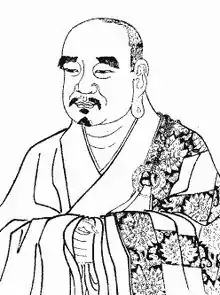Nanyang Huizhong
Nanyang Huizhong (simplified Chinese: 南阳慧忠; traditional Chinese: 南陽慧忠; pinyin: Nányáng Huìzhōng; Japanese: Nanyō Echū; Korean: Namyang Hyech'ung; Vietnamese: Nam Dương Huệ Trung; 675-775 CE) was a Zen monk during the Tang Dynasty. He is often known by his nickname, National Teacher Zhong (Chinese: 忠国师; pinyin: Zhong Guoshi; Japanese: Chū Kokushi) because he was the personal teacher of the Tang Emperors Suzong and Daizong. Huizhong was born in Zhuji, but left home at a young age to become a monk under a Vinaya teacher. Huzhong lived through the so-called "Zen Golden Age", during which many important developments took place, especially the fracturing of the East Mountain School into the Northern, Southern, and Sichuan schools. However, the National Teacher avoided associating with any of the various factions. Indeed, he is purported to have spent forty uninterrupted years practicing Zen on Baiya Mountain's (白崕) Dangzi Valley (黨子) in Nanyang before being summoned by Emperor Suzong in 761.[1] However, he did hold a critical opinion of the Southern School's wholesale denial of sutra-study. He specifically criticized the teaching of Mazu Daoyi, a patriarch of the modern-day Rinzai school, that "Buddha is mind".[2] He is featured in numerous koan collections, including the Blue Cliff Records, The Book of Equanimity, and the Gateless Gate.
 | |
| Title | Chán master |
| Personal | |
| Born | 675 |
| Died | 775 (aged 100) |
| Religion | Buddhism |
| School | Chán |
| Occupation | Teacher |
| Senior posting | |
| Teacher | Dajian Huineng |
| Predecessor | Dajian Huineng |
| Reincarnation | Hanyin Emperor , Tsang Shi |
References
- Ferguson, Andrew E. (2000), Zen's Chinese heritage: the masters and their teachings, Wisdom Publications, ISBN 978-0-86171-163-5
- Welter, Albert (2011), Yongming Yanshou's Conception of Chan in the Zongjing Lu: A Special Transmission Within the Scriptures, Oxford University Press, ISBN 978-0-19-976031-2